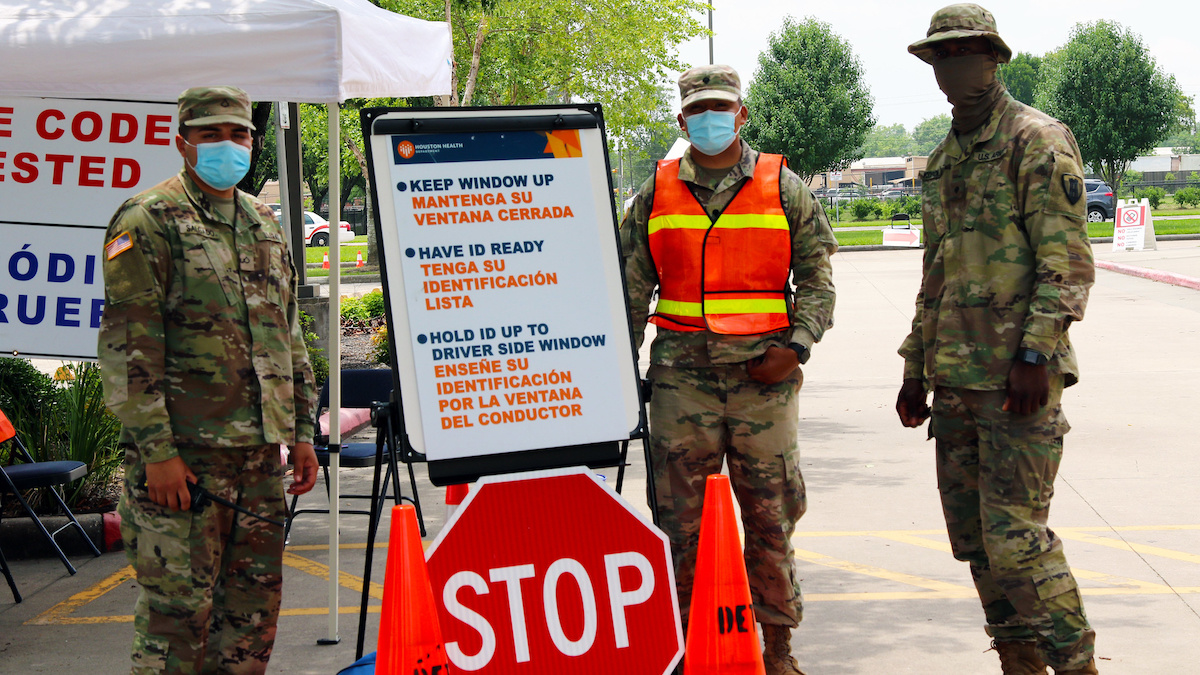
U.S. Coronavirus Cases Top 2 Million as All 50 States Start Reopening

Texas Army National Guard Soldiers prepare to receive patients for COVID-19 tests at a mobile testing team facility at Hilliard Elementary School in Houston, Texas on May 21, 2020. U.S. Army National Guard photo by Sgt. Erin Castle
The number of confirmed coronavirus cases rose past two million Wednesday night, according to Johns Hopkins University data reported by CBS News.
As of early Thursday morning Eastern Time, there were a confirmed total of 2,000,464 cases and 112, 924 deaths in the country that remains the world leader for both metrics. The news comes as all 50 states are reopening to some degree and 17 states report an uptick in the daily average of new cases compared with two weeks ago.
President Donald Trump has been criticized for his handling of the pandemic, as he both downplayed the initial risk and suggested ingesting bleach as a potential cure during a live briefing.
“From the beginning there has been misrepresentations and fabrications from the White House,” director of the National Center for Disaster Preparedness at Columbia University Irwin Redlener told The Guardian. “Whatever the opposite of ‘mission accomplished’ is, that’s what this is. It’s essentially been an American fiasco.”
The disease claimed its first known U.S. life in California just five months ago and quickly spread across the country following an initial outbreak in Washington state, CBS News reported.
The U.S. recorded one million cases 14 weeks into the outbreak, and now two million six weeks after that, according to The Guardian. But public health experts warned that the country was still in the early stages of the outbreak. The disease will not be controlled until at least 60 percent of the population has antibodies, either from being vaccinated or from falling ill and recovering, director of the Center for Infectious Disease Research and Policy at the University of Minnesota Michael Osterholm told The Guardian. And he said that milestone was a long way off.
“At most, perhaps 5% of people have been infected,” he said. “If all that pain, suffering and economic destruction got us to 5%, what will it take to get us to 60%? That’s a sobering thought. All of that suffering and death is just getting started. People haven’t quite got that yet.”
Harvard Global Health Institute leader Ashish Jha told CNN that the U.S. could see 200,000 deaths by September even if the number of new cases just holds steady, Reuters reported.
“And that’s just through September,” Jha said. “The pandemic won’t be over in September.”
Jha attributed the high U.S. numbers to the fact that it was the only major country to reopen without waiting for the rate of people testing positive for the virus to fall to five percent or lower for 14 days.
While initially hard hit states like New York and New Jersey are getting the virus under control, others are seeing their caseload rise. Since June began, 14 states and Puerto Rico have reported their highest weekly average yet for new cases, The Guardian reported Tuesday. Those states are Alaska, Arizona, Arkansas, California, Florida, Kentucky, New Mexico, North Carolina, Mississippi, Oregon, South Carolina, Tennessee, Texas and Utah.
Texas broke its record for coronavirus hospitalizations and Arizona reported one of the steepest upticks in the country.
The timing of the multi-state surge comes after states began to reopen and people gathered outdoors Memorial Day Weekend. Nationwide, cases have begun to increase after declining for weeks, according to Reuters. While some of the newly reported cases could be the result of improved testing, that doesn’t explain all of them.
“It’s very clear that it’s a real increase in community spread,” said Will Humble, executive director of the Arizona Public Health Association, according to NPR. “It’s not some artifact of additional testing.”
Cellphone data suggests that Americans are now moving around at two-thirds of the amount they did before lockdown orders began.
“It seems that we, the U.S., has given up and accepted this disease as a facet of life,” Jeffrey Shaman of the Columbia University School of Public Health told NPR. “It didn’t have to be this way, and it still doesn’t going forward.”
- New Zealand Government Wins Battle Against Coronavirus ...
- As Trump Pushes U.S. to Reopen, Internal Document Projects 3,000 ...
- Reopening Economies Threaten Rural South's High-Risk Groups ...
- Hot Weather and COVID-19: Added Threats of Reopening States in ...
- Your Blood Type Could Make You More (or Less) Vulnerable to Coronavirus - EcoWatch
- The U.S. Isn’t in a Second Wave of Coronavirus – The First Wave Never Ended - EcoWatch
- U.S. Breaks World Record With More Than 55,000 New Coronavirus Cases in a Day - EcoWatch
- Coronavirus Cases Spike in the South, Decline in Northeast - EcoWatch
- U.S. Shatters Daily Coronavirus Case Record for 11th Time This Month - EcoWatch
- U.S. Coronavirus Cases Surpass 5 Million, Only 17 Days After Hitting 4 Million - EcoWatch
- How New Zealand Has Eliminated COVID-19 - EcoWatch
- How New Zealand Has Eliminated COVID-19 - EcoWatch

 233k
233k  41k
41k  Subscribe
Subscribe 